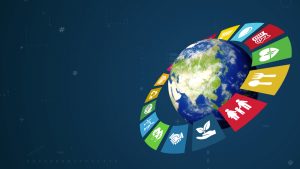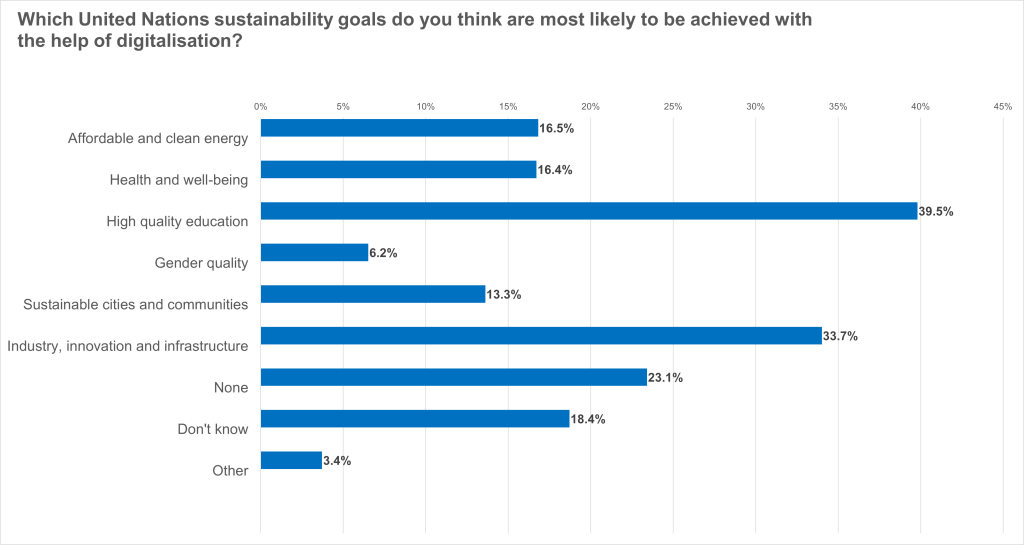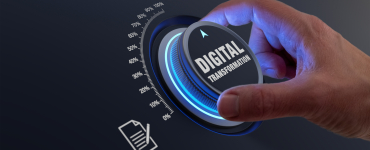- On 17 May, the “World Telecommunication and Information Society Day” highlights the importance of the Internet for achieving the 17 Sustainable Development Goals of the United Nations
- According to the eco survey, “high-quality education” (39.5 per cent), “industry, innovation and infrastructure” (33.7 per cent) and “affordable and clean energy” (16.5 per cent) are goals that are most likely to be achieved with the help of digitalisation.
According to a representative Civey survey commissioned by eco – Association of the Internet Industry, many Germans say that the Internet industry is making a major contribution to better shaping our future. In being asked which of the United Nations’ sustainability goals are most likely to be achieved with the help of digitalisation, respondents named “high-quality education” (39.5 per cent), “industry, innovation and infrastructure” (33.7 per cent) and “affordable and clean energy” (16.5 per cent). The United Nations’ “World Telecommunication and Information Society Day” on 17 May highlights how the Internet and digital economy contribute to achieving the United Nations’ 17 global goals for a better future.
“I am of the strong opinion that, as humans, we will only be able to master the major issues of the future with the help of digital technologies and applications,” says eco’s Managing Director Alexander Rabe. “Digital infrastructures and digital services are part of the solution and don’t just contribute to the UN’s 17 Sustainable Development Goals in an ecological respect.” As an example, he mentions connected mobility that optimises traffic flows and that will save up to 50 per cent of CO2 emissions in urban car traffic by 2030. “The potential of digitalisation for shaping a sustainable future is immense – but even today, the eco-balance of digitalisation is already positive,” Rabe continues.
World Day on opportunities and possibilities of the Internet and other information and communication technologies
Digitalisation also offers huge potential for improving educational opportunities around the globe. With 39.5 per cent of the responses in the Civey survey, many people in Germany share this assessment. However, the potential is still insufficiently exploited in many countries, including Germany: “The school system in Germany needs a fundamental update. Digital education is the central task for the future in order to be able to competently shape the digital transformation of the economy and society. We need an education system that considers the principle of lifelong learning, establishing teaching and learning via digital media and digital technologies, to take place at all levels of the education system.”
With the 2030 Agenda adopted in 2015, the global community under the umbrella of the United Nations committed to 17 global goals for a better future. The guiding principle of the 2030 Agenda is to enable a decent life worldwide and at the same time to preserve the natural basis of life in the long term. This includes economic, ecological and social aspects. In this context, the 2030 Agenda emphasises the shared responsibility of all actors: politicians, industry, academics, civil society – and every individual.
United Nations defined 17 sustainability goals
The United Nations proclaimed the World Telecommunication and Information Society Day for 17 May. The World Telecommunication Day has been taking place since 1969. In 2006, the day was expanded to also refer to the importance of the information society. The annual day serves to highlight the versatile opportunities and possibilities of the Internet and other information and communication technologies (ICT). It is hosted by the International Telecommunication Union (ITU) and aims to highlight the importance of ICT for achieving the 17 Sustainable Development Goals (SDGs).
The eco initiative #Join the Solution: We are part of the solution – the Internet industry presents digital solutions that illuminate the positive impact of digitalisation: Whether it’s CO2 reduction through green IT and green coding in the fight against climate change, smart city concepts that make our cities more habitable, resource-friendly and energy-efficient, health care technologies that detect cancer at an early stage on the strength of artificial intelligence, or digital platforms that promote social cohesion and humanitarian causes.
Download graphic





